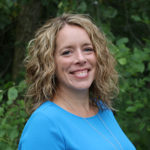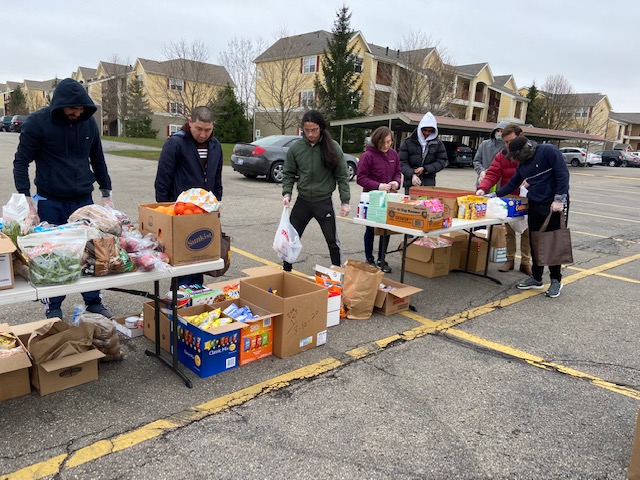W hen the COVID-19 pandemic hit, normal life went out the window—for individuals and for churches.
It didn’t take long, however, for people and congregations to find new ways to be on mission.
The pandemic and resulting precautions challenged physical, mental, and financial health. All the uncertainty and loss meant there’s almost no better time than now to be the hands and feet of Jesus to your neighbors.
Here are several snapshots from around the Reformed Church in America of living out Jesus’s call to love your neighbor as yourself, even in the midst of a pandemic.
Supporting International College Students
Western Michigan University, Kalamazoo, Michigan
No job. No public transportation. No access to food.
That was the reality for the roughly 500 international students from Western Michigan University (WMU) when Michigan’s Stay Home, Stay Safe order went into effect in March 2020, in response to COVID-19.
At least, that was the reality for students until Laura Osborne and friends stepped up.
Osborne leads International Campus Ministry in Kalamazoo, Michigan, with Jordan Palladino; she’s also the Reformed Church in America’s coordinator for interreligious relations. Osborne and Palladino heard that Michael Famiano, a physics professor at WMU, started a mobile food pantry out of his car. Because of Osborne’s connections, what started as one man helping international students soon became a community-wide effort.
Osborne has worked with a food pantry in nearby Mattawan for 15 years so she understands how that works, and, as a pastor, has a huge network of people and churches that are more than willing to support students experiencing need. They also teamed up with Kalamazoo Loaves and Fishes, a prominent food pantry that distributes food to five different sites around Kalamazoo. At the height of the lockdown, they were delivering to three different sites and fed about 5,000 students.
The socially-distanced interactions with students brought a new need to light: with campus mostly closed and school visas not allowing for jobs off campus, lack of work meant difficulty paying bills. Osborne, Palladino, and Famiano spoke with a contact at the college about how to help. Due to red tape, working through the university wasn’t an option. Instead, Osborne called on her local governing body, Southwest Classis, to help. All money raised went through the classis and was given to the students. With donations, a grant for $100,000, and a partnership with the Kalamazoo Community Foundation, the group raised about $200,000 and helped about 400 students pay their bills.
COVID-19 restrictions have fluctuated since March, and Osborne, Palladino, and Famiano have been flexible. Famiano started a new 501(c)3 called Community Student Connections that will continue the food pantry and financial disbursements as needed. Osborne and Palladino have gone back to working with the students involved in International Campus Ministry, which includes relationship building and lunch on Thursdays—now a sack lunch because of the pandemic instead of a sit-down meal.
“I’m just still in awe of what the community did,” Osborne says. “And a lot of people say, ‘You did such a great thing.’ No. I’m just like a connector to people. … Bottom line, I genuinely love this community. And these are students that I want to see flourish, and I have the resources, which is people to pull together. So then, let’s do it.”
Feeding New York’s Food Insecure
DeWitt Reformed Church, New York, New York
“In May, June, and July, I think we made over 8,000 bags of food,” says Micheal Edwards of DeWitt Reformed Church in New York City. That’s a lot, even for the DeWitt Reformed Church Food Pantry, a major food pantry in New York City.
The reason? COVID.
“There’s a greater need because people were unemployed. People were laid off,” explains Edwards. “I was told of refugees and immigrants who cannot get benefits and support from the government.”
Serving food-insecure New York residents is not something new for DeWitt Reformed. They’ve been doing that for nearly 30 years—and it’s quite the operation. Between the food donations, donations and funds from individuals, the United Way, and other organizations, the budget is nearly $150,000 a year. And all this is run by DeWitt Reformed’s consistory and staffed by volunteers.
When COVID hit, DeWitt’s food ministry came to a screeching halt. COVID restrictions initially closed the food pantry. But the food shortage for people who are food insecure weighed heavily on the hearts of the church members. Prayerfully, and following social distancing guidelines, members of the church started to get back to providing bags of food.
The problem was that many things were still shut down. Many people had lost jobs or had their hours cut, and were having great difficulty finding work. As a result, more were now experiencing food insecurity. But God provided. Both the city and state of New York gave DeWitt Reformed funds. Intersections International (a ministry in New York City) and the Classis of New York also provided money, and the church received a COVID-19 response grant from the Reformed Church in America. To adhere to social distancing guidelines, DeWitt Reformed partnered with other churches in the area for both storage of food and packing the food bags.
So they were not only able to provide food for hungry people, but they also made almost 600 lunches for police officers, firefighters, local security services, and health care workers. “The joy of this success in ministry was the response received from these individuals who thanked the church and its members for thinking about them by providing meals,” says Edwards.
As with all of us, DeWitt Reformed has found a new normal. The food pantry is back to operating from the church. The church also operates a Head Start and after-school program in the building. In the past, the food pantry was open on Mondays and Thursdays, and if any families whose children went to the school needed food, they could grab it. Because of social distancing guidelines, the food pantry is now open on Saturdays only.
Giving Grocery Vouchers to African Markets
Refuge Church (located in the South)*
*Outreach to unreached people can be sensitive work, so in this article, locations are deliberately broad, and names have been changed.
Of the more than 20 million people worldwide of a particular East African people group, only about 1,000 are Christian believers.
There’s a significant population from this people group in the Southern metro city where Refuge Church was started about five years ago. The Jameses were part of the core team that planted Refuge Church. Since then, they have felt called to plant another church in one of the most ethnically diverse areas of their city, and an area where there are many East African immigrants. They now have a budding house church with nine to fifteen people when it meets during the week.
At first, the Jameses wondered how to build relationships with people who do not trust them, and who fear being isolated by others for associating with Christians. The answer?
Selling camel milk.
Camel milk is a key part of East African culture, and many of the immigrants had not had it since arriving in the United States. The Jameses buy the camel milk from a distributor and sell it to international coffee shops and markets where they live.
Now they have a business that is trying to be the hands and feet of Jesus to the East African community. And it has helped them build up trust in that community. That trust is already bearing fruit. When COVID hit, they could come alongside and help the people who had lost jobs and lost loved ones.
The Jameses applied for and received a COVID-19 response grant from the Reformed Church in America; with that money, they purchased $50 and $100 grocery vouchers to the African markets that sell camel milk. They worked with the local community association to identify people with need and have met 100 to 120 new families through this.
“We would hand-deliver the grocery voucher, so we can see where they live. We show up, and we offer to pray for them. It’s just been a really great experience,” says the couple. “It’s been invaluable in [that] it’s building this bridge of trust for us to show that we care. … We want to embody the message, and we want to be a people that reflect Jesus with how we serve and how we give and how we go.
“We’re excited to see where the Lord takes these relationships in terms of the kingdom growing.”
This article was also published in RCA Today, the Reformed Church in America’s denominational magazine.

Jennifer Knott
Jennifer Knott is a former writer and editor for the Reformed Church in America’s communication team.



